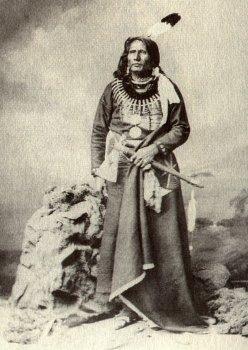Earth First! Newswire

Ponca chief, Standing Bear, the first American Indian recognized in courts as a person.
Keystone XL pipeline opponents took to a Neligh rancher’s land Saturday, protesting the proposal they say cuts through the historic Ponca Trail of Tears and poses a steep environmental risk. Ponca tribal families, Oceti Sakowin tribes, Brave Heart Society, Bold Nebraska, and others — hosted the Ponca Trail of Tears Spiritual Camp, the first in a series of tribal events aimed at showcasing solidarity among ranchers and Native Americans against TransCanada’s project. “It’s the continuation of unprecedented unity of the allies that are trying to stop this black snake that is trying to come into our tribal territory,” said Faith Spotted Eagle, a grandmother in the Brave Heart Society and member of the Ihanktonwan.
The northern segment of the pipeline awaits the Obama administration’s decision, which is expected in 2014. The southern half of the Keystone XL, also known as the Gulf Coast Project was expedited by the Obama administration and is expected to be operational in early 2014.
The groups charge that the pipeline’s 1,179-mile path cuts across sacred tribal land where Chief Standing Bear and his fellow Ponca walked to Oklahoma in a forced migration from their homes in northern Nebraska.
Ponca leaders have rejected all five offers for TransCanada conducted cultural surveys of the pipeline easement.State and federal law dictates that TransCanada must go around known burial grounds and archaeological sites. Should crews uncover remains or artifacts during construction, work must stop immediately for reburial or excavation of artifacts.
Over the weekend, the protesters lit a ceremonial fire, erected an 18-foot-tall tepee, shared stories and held communal lunches. About 30 people participated in Friday’s events, and similar attendance is expected through Monday morning. At sunrise Monday, the camp will close as the fire is extinguished and protesters pray to Mother Earth for the protection of the land from tar sands oil and the Keystone XL pipeline.
This is the first of four planned tribal spiritual camps in opposition to the Keystone XL throughout the fall and winter. “I think more than thoughts, we’re sending prayers they’ll come to their senses,” Faith Spotted Eagle said.
January saw the signing of the International Treaty to Protect the Sacred from Tar Sands Projects. The treaty was signed by the Yankton Sioux, Ogala Sioux, The Black Hills Treaty Council, The Great Plains Tribal Chairman’s Association, Yinka Dene Alliance, Indigenous Environmental Network and others.
